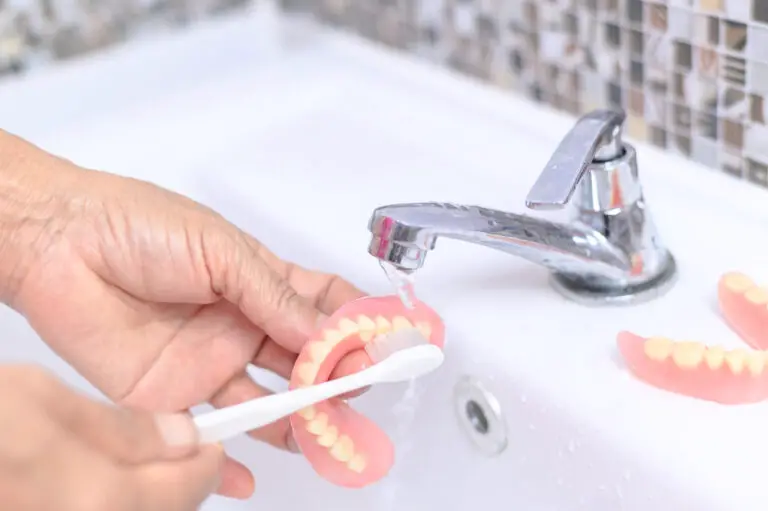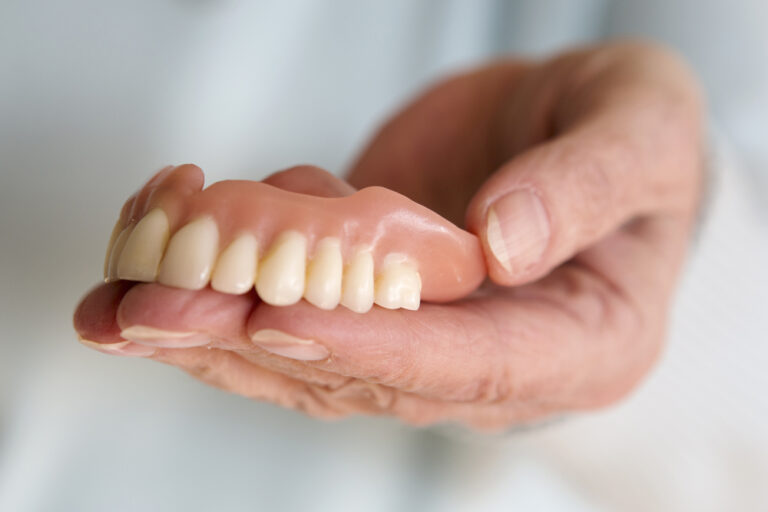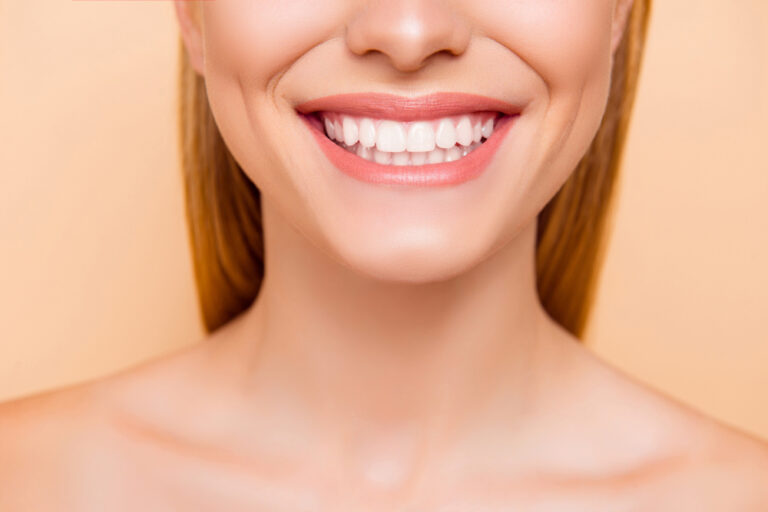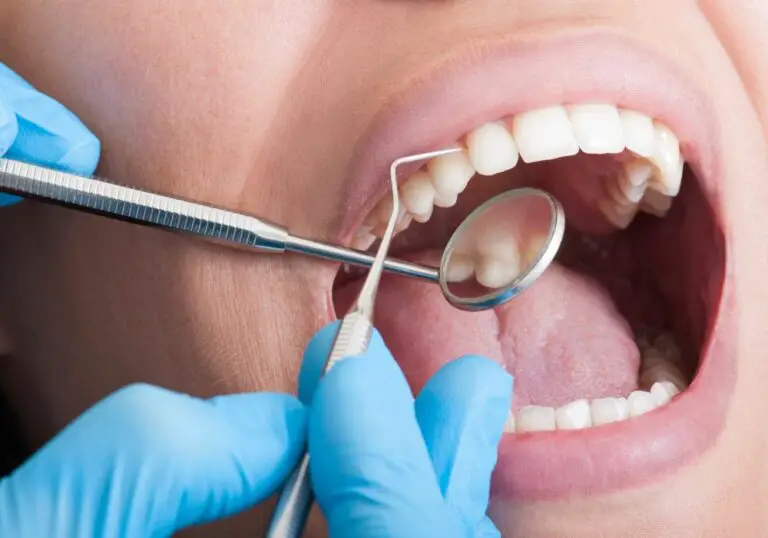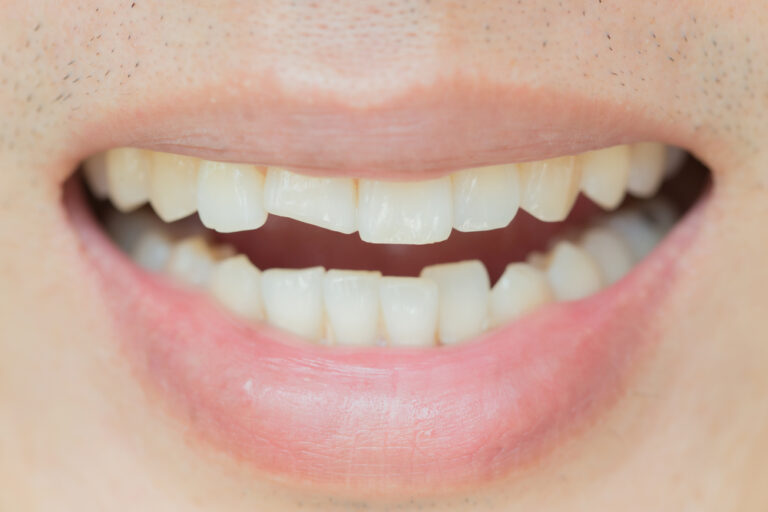Teeth clenching and grinding, known medically as bruxism, involves excessive grinding, clenching or gnashing of the teeth. It typically occurs involuntarily, most often during sleep. People are often unaware of their bruxism habits until dental damage or jaw pain develops.
This article explores the detailed causes, symptoms, diagnosis and treatments for teeth clenching and grinding.
What Triggers Teeth Clenching and Grinding?
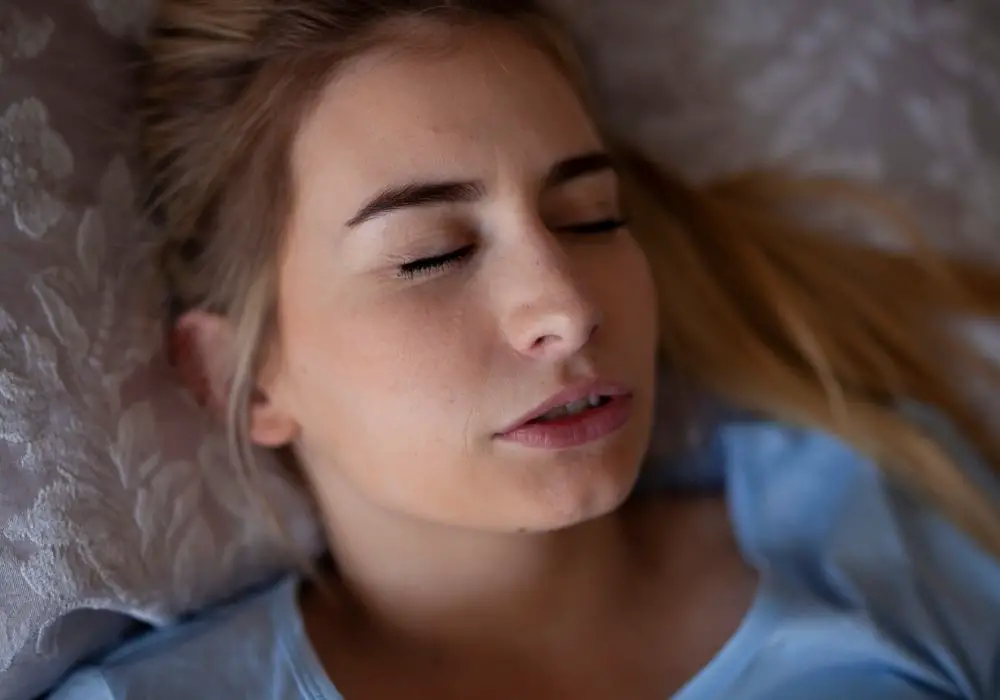
There are many possible causes and risk factors for bruxism:
Stress and Anxiety
- Emotional stress often manifests physically through parafunctional habits like teeth grinding. The stress hormone cortisol is implicated, along with overactivity of the sympathetic nervous system and the innate “fight or flight” response.
- Increased responsiveness of the amygdala, the brain’s emotional center, likely plays a role in stress-induced bruxism.
- Teeth clenching may function as an unconscious outlet for internal turmoil, tension, anger or frustration.
- Triggers can include work pressure, financial stress, relationship conflict, major life changes and traumatic events. The COVID pandemic markedly increased bruxism prevalence.
Sleep Issues
- Sleep disorders like obstructive sleep apnea cause oxygen desaturation and brief arousals during sleep, which can trigger teeth grinding and clenching.
- Even without apnea, abnormalities in sleep architecture or frequent awakenings can activate the sympathetic nervous system and lead to bruxism. Teeth grinding peaks during REM sleep.
- Consumption of alcohol before bed disrupts sleep quality and is associated with increased bruxism habits at night.
Occlusal Factors
- Misalignments in the bite or spacing/crowding of teeth can cause clenching or grinding habits, as the upper and lower teeth seek a stable occlusal position.
- Underbite, overbite, crossbite, open bite and overclosure all involve disrupted alignment between the maxilla and mandible, increasing risk for bruxism.
- Missing teeth, crooked teeth and teeth interference on closure impact the harmonious contact between opposing teeth, potentially leading to clenching or grinding.
- Dental restorations like crowns, bridges or implants that are not properly contoured and aligned can also contribute to bruxism. Grinding may initially occur to “settle” the teeth into a more comfortable position.
Genetic and Neurological Factors
- Family history and genetic predisposition likely play a role, with high inheritance rates for bruxism. Polymorphisms in genes related to dopamine and serotonin may be involved.
- Movement disorders like Parkinson’s disease show increased prevalence of teeth clenching and grinding. This is likely related to dysregulation of the basal ganglia and abnormal signaling between subcortical nuclei and motor pathways.
- Traumatic brain injury, neurodegenerative disease, and seizures may also impact areas of the brain involved in controlling jaw movement, increasing bruxism risk.
Medications and Substances
- Bruxism can occur as a side effect of certain medications that influence dopamine and serotonin activity, including some antidepressants, amphetamines and anticonvulsants.
- Both prescription and recreational stimulants like cocaine, ecstasy, methamphetamine and caffeine have been associated with teeth grinding habits.
- Even over-the-counter medications like Aleve, Advil and Tylenol contain compounds that may potentially worsen bruxism in some individuals.
Risk Factors
- Age – Bruxism most often occurs in adults age 20-50.
- Gender – Some research shows increased risk in females.
- Personality – Type A perfectionist personality traits may predispose some to bruxism.
- Smoking and alcohol – Nicotine and alcohol appear to exacerbate bruxism.
Recognizing the Signs and Symptoms
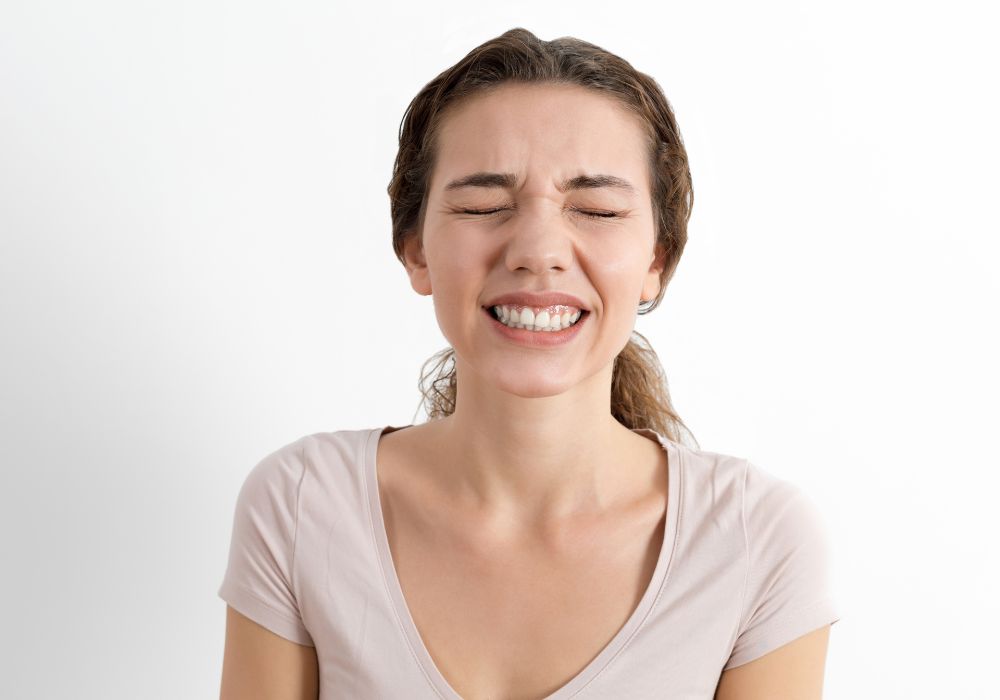
Detecting the signs of excessive teeth grinding and clenching early allows quicker treatment to minimize dental damage and pain:
- Physical symptoms – jaw pain, stiffness or tightness, sore or painful jaw muscles, headache (particularly in the temples), earache, tooth sensitivity, damaged dental work.
- Dental symptoms – worn, flattened or fractured teeth, excessive tooth mobility, receded gums, hypersensitive teeth, damage to crowns, veneers, fillings or dental implants.
- Sleep symptoms – partner or family notice grinding noises during sleep, waking with a headache or sore jaw.
- Habits – chewing on pens, nails or cheeks, clenching the jaw frequently during the daytime.
Keeping a journal with entries about headaches, jaw pain and sleep quality can help identify bruxism triggers and patterns.
Diagnosing Bruxism: Exams and Testing
If teeth clenching or grinding is suspected, your dentist will perform a comprehensive oral examination looking for:
- Tooth, gum and jaw damage – Signs of wear, fractures, sensitivity, loose teeth, receded gums indicate bruxism. Imprints or indentations on the cheeks, tongue or lips from the teeth may be visible.
- Jaw joint tenderness – Palpation of the temporomandibular joints will reveal pain and dysfunction if impacted by excessive clenching and grinding forces. Clicking, popping or difficulty opening the jaw fully are common.
- Dental impressions – Sets of the patient’s teeth can show imprints and abnormally flattened areas caused by clenching and grinding. They allow analysis of occlusal contacts.
- Face/jaw photos – Comparing past and present photos helps identify changes over time in smile characteristics and jaw position from bruxism.
- X-rays and CT scans – Imaging studies check for damage to tooth roots, jaw joints and surrounding bone from chronic grinding forces.
- EMG – Electromyography records jaw muscle activity during wakefulness and sleep, confirming bruxism diagnosis.
- Sleep study – Monitored overnight sleep study screens for apnea and abnormal sleep patterns that can trigger teeth grinding.
Custom Treatment Approaches for Bruxism
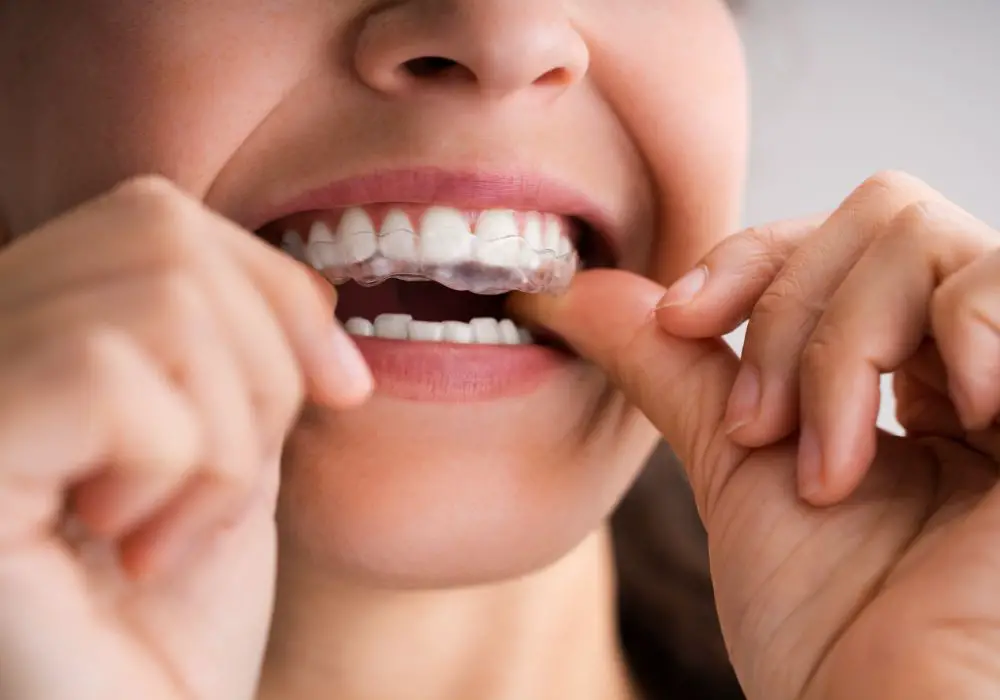
Integrated treatment tailored to the individual’s suspected triggers provides better management of clenching and grinding:
Stress and Anxiety Treatment
- Counseling and cognitive-behavioral therapy skills to reduce stress reactivity.
- Relaxation techniques like controlled breathing, meditation, yoga, massage therapy.
- Improving sleep quality through sleep hygiene education.
- Exercise programs to reduce muscular tension.
- Addressing sources of stress, conflict and imbalance through life coaching.
Dental and Occlusal Approaches
- Nightguard – Wearing a custom hard acrylic or soft rubber mouthguard during sleep to protect teeth from grinding forces. Can also reduce pain.
- Occlusal adjustment – Selectively reshaping teeth contacts and restorations to achieve harmonious alignment and proper positioning at closure. This reduces strain on the jaw muscles and joints.
- Dental repair – Replacing damaged fillings, crowns or other dental work to restore proper chewing surfaces.
Medical Approaches
- Medication adjustment – Altering or discontinuing medications linked to increased bruxism, when possible.
- Botox injection – Using botulinum toxin injected into strained jaw muscles helps relax them and reduce grinding forces. Effects last 3-6 months.
- CPAP machine – Using nighttime continuous positive airway pressure therapy eliminates sleep apnea, reducing bruxism.
- Physical therapy – Jaw and neck exercises help strengthen muscles, improve alignment and reduce parafunctional habits.
The Importance of Preventing Permanent Damage
Unaddressed clenching and grinding habits allow ongoing destruction of the teeth and jaw joint anatomy. Seeking prompt professional treatment is key to intercepting bruxism before permanent tooth loss, occlusal instability, chronic pain and joint damage develop. A multifaceted approach addressing the individual’s unique predisposing factors provides sustained relief and protection.
Frequently Asked Questions (FAQ)
Q: What causes sudden teeth grinding at night?
A: Sudden onset nocturnal bruxism may be triggered by new stress, anxiety, alcohol consumption, medication effects, underlying sleep disorders or dental problems. Evaluation is needed to pinpoint causes.
Q: Can you permanently stop clenching teeth?
A: For chronic bruxism, there is no permanent “cure” but symptoms can be effectively managed through mouthguards, bite adjustment, therapy, medication, and CPAP if indicated. The goal is to protect teeth from damage long-term.
Q: How do you relax clenched jaw muscles?
A: Massage, moist heat, jaw stretches/exercises, anti-inflammatory medication, muscle relaxants, and Botox may help relax clenched muscles. Reducing stress and anxiety through counseling is key for sustained improvement.
Q: Can teeth clenching cause sinus problems?
A: Yes, chronic bruxism can contribute to sinus congestion and pain due to the downward pressure placed on maxillary sinuses by grinding forces, impacting sinus drainage and function. Prompt bruxism treatment is advised.
Q: Can you clench teeth while awake?
A: Yes, awake bruxism or clenching due to stress, anxiety, concentration and other triggers is quite common. A mouthguard, stress reduction and biofeedback can help minimize daytime clenching.

